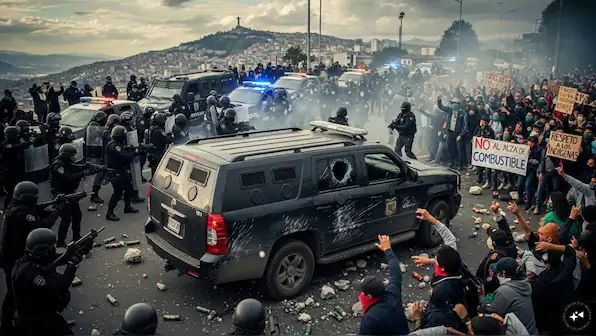Ecuador’s President Daniel Noboa escaped unharmed after his motorcade came under attack during demonstrations against rising fuel prices, in what authorities have described as an assassination attempt.
The incident happened on Tuesday while Noboa was inaugurating a water treatment plant in central Ecuador. Around 500 protesters surrounded his convoy, throwing stones and other projectiles. Environment Minister Ines Manzano said the president’s vehicle showed “signs of bullet damage” after the attack.
“The level of aggression with which the convoy was attacked indicates that this was a clear assassination attempt and an act of terrorism against the president,” Defence Minister Gian Carlo Loffredo told local television.
Video footage released by the government, reportedly filmed from inside the motorcade, showed demonstrators standing on the road, draped in flags, and gathering large stones and bricks. As the armored SUV passed, projectiles cracked windows and struck the vehicle’s panels. A voice inside the car can be heard shouting, “Heads down! Heads down!”
Five people were arrested and are expected to face terrorism charges, which carry a maximum sentence of 30 years.
The attack came during two weeks of nationwide Indigenous-led protests sparked by Noboa’s decision to end diesel subsidies, causing fuel prices to surge. Demonstrators have blocked roads, staged strikes, and abducted 16 soldiers, who were later released unharmed. A protester was killed on September 28 during clashes with security forces.
The Confederation of Indigenous Nationalities of Ecuador (CONAIE) accused authorities of using “brutal police and military action” during Tuesday’s unrest, claiming elderly women were among those assaulted. The group said at least five people were “arbitrarily detained.”
Noboa’s office said on social media that “cowardly acts will not deter” the president, who continued his official schedule after the attack.
The unrest highlights Ecuador’s growing instability. Once one of Latin America’s safest nations, the country has seen a surge in violence, driven in part by its position between Colombia and Peru, two of the world’s largest cocaine producers. Authorities say drug gangs are exploiting the protests to destabilize the government.
Around 70 percent of the world’s cocaine supply is believed to pass through Ecuador, attracting major criminal organisations, including Mexico’s Sinaloa Cartel, Italy’s ‘Ndrangheta, and Albanian mafia groups. Their rivalry has made Ecuador one of the region’s most dangerous countries.
Noboa, who took office in November 2023, is pursuing austerity measures aimed at saving about $1 billion by cutting fuel subsidies and redirecting funds to security. He has also called for a referendum to allow the return of US troops to Ecuador, reversing a 2009 ban on foreign bases.
Albert Ramdin, head of the Organisation of American States, condemned the attack, calling it “an assault on democracy, stability, and the spirit of peaceful coexistence that must prevail in our societies.”
Investigations into the attack are ongoing.

